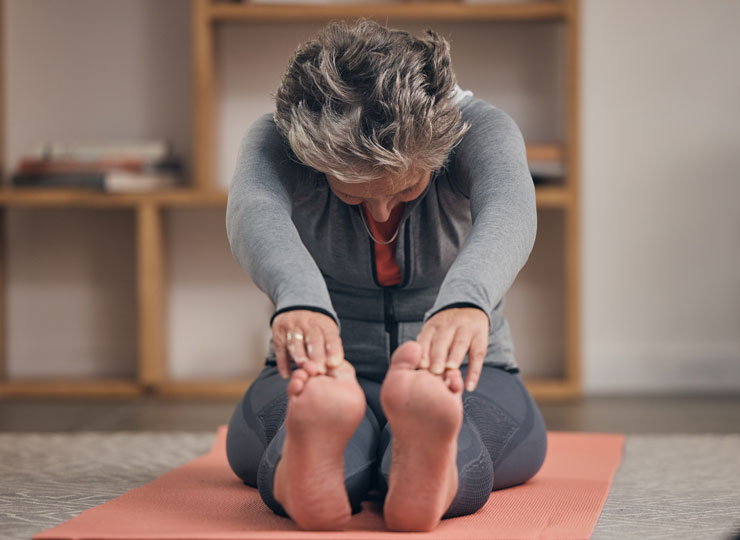
September 6, 2023
Need a gentle way to help relieve stress and give your memory a boost? Try yoga. A three-month program of yoga and meditation had cognitive benefits comparable to those of a memory-training program, while providing additional stress-relieving benefits.
The yoga program was part of a small study at the University of California, Los Angeles, that looked at 22 older women who were part of an ongoing study exploring how yoga affects the risk of developing Alzheimer’s disease. Most participants were in their 60s.
Though none of them had Alzheimer’s, all were at increased risk of developing the illness. They had all complained about growing forgetfulness or mild memory problems in the previous year. They also had heart-related health issues that can increase the risk of developing Alzheimer’s or other forms of dementia, such as hardening of the arteries, a previous heart attack, diabetes, high blood pressure or high cholesterol levels.
The women took part in a 60-minute, in-person training program once a week for 12 weeks, which also included daily at-home practice exercises. About half the women were trained in Kundalini yoga, a gentle form of yoga that centers on breathing exercises, meditation, mental visualizations and chanting.
The rest participated in a memory enhancement training program designed to help people better remember daily tasks. The program offered strategies for remembering things like faces and names (using visual cues), grocery lists (grouping items according to categories), doctor’s appointments, locking doors and where you placed the car keys (using spatial cues and strategies like creating stories around items on a list).
The women also underwent specialized functional MRI brain scans to measure connectivity in the hippocampus, a part of the brain critical for learning and memory. The hippocampus is often one of the first areas of the brain to be damaged by Alzheimer’s disease.
At the end of three months, both groups showed improvements in connections between cells in the hippocampus, suggesting improved memory capacity. But those in the yoga group showed greater improvements in parts of the hippocampus often impaired by stress.
“The key takeaway is that this study adds to the literature supporting the benefits of yoga for brain health, especially for women who have greater perceived stress and subjective memory impairment,” said Dr. Helen Levretsky, the study’s senior author and director of the Late-Life Mood, Stress, and Wellness Research Program at UCLA. “This gentle form of yoga, which focuses more on breathing and mental engagement than on movement, like other forms of yoga, is ideal for older adults who may have some physical limitations.”
The findings add to a growing body of research that suggests that programs for the mind and body can help to strengthen the brain, regardless of your age. Earlier research by Dr. Lavretsky found, for instance, that yoga and meditation provided memory boosts to men and women with mild cognitive impairment, or MCI, a serious form of memory loss that can progress to full-blown Alzheimer’s. Other studies have shown that the slow, graceful movements of tai chi, an ancient martial art sometimes referred to as meditation in motion, provided similar brain benefits.
Dr. Lavretsky’s group has also shown that meditation may be good for those caring for a loved one with Alzheimer’s as well. Caregivers taught meditation showed lower levels of stress and better coping skills. They also showed clear reductions in levels of various proteins linked to inflammation, which scientists increasingly recognize as a contributor to heart disease and other chronic illnesses, including Alzheimer’s disease.
Combining a yoga and meditation program with brain-training exercises, along with regular physical exercise and eating a heart-healthy diet, may be most effective of all, experts say. Being out in nature is also known to reduce stress levels and may lower your dementia risk, studies show. Find activities you enjoy, whether it’s a dance class, a walk on the beach, daily breathing exercises or a morning meditation. You’ll likely feel calmer, and it may help to keep Alzheimer’s at bay.
By ALZinfo.org, The Alzheimer’s Information Site. Reviewed by Eric Schmidt, Ph.D., Fisher Center for Alzheimer’s Research Foundation at The Rockefeller University.
Source: Lisa A. Kilpatrick, Prabha Siddarth, Beatrix Krause-Sorio, et al: “Impact of Yoga Versus Memory Enhancement Training on Hippocampal Connectivity in Older Women at Risk for Alzheimer’s Disease.” Journal of Alzheimer’s Disease, August 29, 2023











